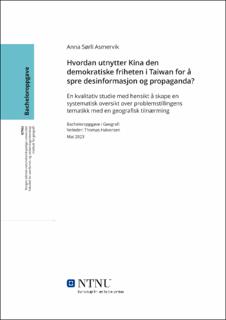| dc.contributor.advisor | Halvorsen, Thomas | |
| dc.contributor.author | Asmervik, Anna Sørli | |
| dc.date.accessioned | 2023-06-30T17:23:31Z | |
| dc.date.available | 2023-06-30T17:23:31Z | |
| dc.date.issued | 2023 | |
| dc.identifier | no.ntnu:inspera:142256558:34432276 | |
| dc.identifier.uri | https://hdl.handle.net/11250/3075002 | |
| dc.description.abstract | Kina og Taiwan har et turbulent forhold. Kinas ønske om en gjenforening med Taiwan blir ikke møtt med aksept fra det demokratiske fremskrittspartiets (DPP) regjering. Mens Fastlands-Kina har et autoritært kommunistisk styre der det kinesiske kommunistpartiet (KKP) har den øverste makten i landet, har Taiwan blitt godt vant til et fritt og demokratisk politisk system. Ideologiene til de to statene er svært ulike, noe som gjør en eventuell gjenforening mellom Sundet mer komplisert.
I et forsøk på å svekke DPP-regjeringen utforsker kommunistene i Kina ulike metoder for å spre propaganda og desinformasjon i Taiwan, som inkluderer blant annet betalte annonser, falske nyheter på sosiale medieplattformer og økonomiske straffer. Taiwan er har ett av verdens frieste nettmiljø, noe Fastlands-Kina utnytter i sine desinformasjonskampanjer. Det frie nettmiljøet og ytringsfriheten til Taiwan gjør at øyas regjering ikke har mulighet til å direkte sensurere pro-Beijing-fortellinger uten å skade sin demokratiske frihet. Taiwan har forsøkt å stå imot propaganda- og desinformasjonskampanjene fra Kina med taktikker som for eksempel fakta-sjekk-verktøy, lover om KKP-innflytelse og motstandsbevegelser som Anti-Red Media-bevegelsen.
Kina has økte politiske og økonomiske innflytelse i resten av verden skyldes internasjonal handel og globalisering. Kina har blitt en sentral handelspartner for mange land, som gir dem enklere tilgang til å bruke økonomisk press mot Taiwan. Den økonomiske globaliseringen ser ut til å ha blitt en større interessekjerne enn demokratiske stater. | |
| dc.description.abstract | China and Taiwan have a turbulent relationship. China's desire for a reunification with Taiwan is not met with acceptance by the Democratic Progressive Party (DPP) government. While Mainland China has an authoritarian communist government where the Chinese Communist Party (CCP) holds supreme power in the country, Taiwan has become well accustomed to a free and democratic political system. The ideologies of the two states are very different, which makes a possible reunification between the strait more complicated.
To weaken the DPP government, the Communists in China are exploring various methods of spreading propaganda and disinformation in Taiwan, which include paid advertisements, fake news on social media platforms, and financial penalties, among others. Taiwan has one of the world's freest online environments, which mainland China exploits in its disinformation campaigns. Taiwan's free online environment and freedom of speech mean that the island's government has no way to directly censor pro-Beijing narratives without harming its democratic freedom. Taiwan has attempted to counter China's propaganda and disinformation campaigns with tactics such as fact-checking tools, CCP influence laws, and resistance movements such as the Anti-Red Media movement.
China has increased political and economic influence in the rest of the world due to international trade and globalization. China has become a key trading partner for many countries, giving them easier access to apply economic pressure against Taiwan. Economic globalization seems to have become a bigger core of interest than democratic states. | |
| dc.language | nob | |
| dc.publisher | NTNU | |
| dc.title | Hvordan utnytter Kina den demokratiske friheten i Taiwan for å spre propaganda og desinformasjon? | |
| dc.type | Bachelor thesis | |
